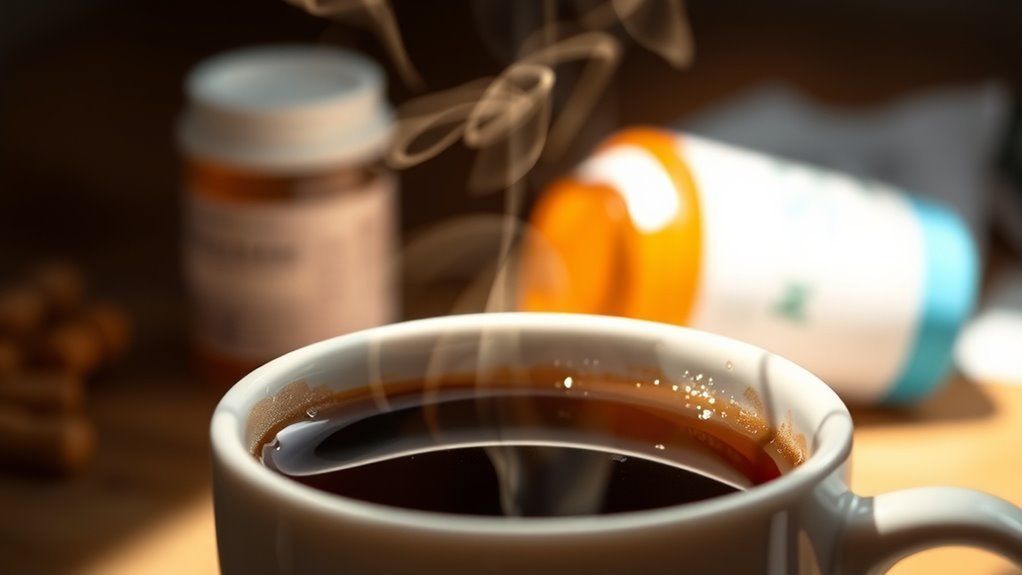Can You Drink.Coffee After Wisdom Teeth
You shouldn’t drink coffee right after wisdom teeth removal. Caffeine can irritate your healing gums and may dehydrate you, which is not ideal during recovery. It’s best to wait at least 24 to 48 hours post-surgery before consuming coffee. When you do drink it, make certain it’s cooled down, and start with small amounts. Staying hydrated is vital for healing. Understanding more about your recovery can help guarantee a smoother process.
Understanding Wisdom Teeth Removal

Wisdom teeth removal is a common dental procedure for many adults, often occurring between the ages of 17 and 25. These third molars can lead to complications such as crowding, impaction, or infection, making their extraction necessary for your oral health. The surgical procedure typically involves local anesthesia and may require sedation to guarantee you’re comfortable throughout the process. Your dentist or oral surgeon will carefully assess your situation, taking X-rays to determine the position of the wisdom teeth. After discussing the risks and benefits, they’ll guide you through what to expect. Understanding this procedure empowers you to make informed decisions about your dental care, allowing you to prioritize your well-being and maintain a healthy, pain-free smile.
The Healing Process After Surgery
After your wisdom teeth removal, it’s important to understand the healing process that follows. Initially, you’ll likely experience swelling, which can be managed with ice packs and anti-inflammatory medications. Swelling reduction is vital for a smoother recovery. As you heal, focus on your nutrition intake; soft foods like yogurt, smoothies, and mashed potatoes can aid in your recovery while providing essential nutrients. Staying hydrated is equally significant, so drink plenty of water. Avoid straws, as they can dislodge blood clots and hinder healing. Listen to your body, and don’t rush back to normal activities. Prioritizing rest and following your dentist’s post-operative instructions will help guarantee your recovery is as comfortable and swift as possible.
Effects of Caffeine on Recovery

Caffeine can influence your recovery after wisdom teeth removal in various ways. While it may help with pain management by enhancing the effects of certain medications, it can also lead to increased anxiety and hinder healing if consumed in excess. Understanding these effects is essential for making informed decisions about your caffeine intake during your recovery.
Caffeine and Healing
While many people enjoy a cup of coffee to kickstart their day, it’s important to reflect on how caffeine can impact your recovery after dental surgery. Caffeine effects can influence your healing process, so it’s essential to take into account the following:
- Increased Heart Rate: Caffeine can elevate your heart rate, potentially hindering your body’s ability to rest and recover effectively.
- Dehydration Risk: Caffeine is a diuretic, which may lead to dehydration, impeding recovery nutrition that supports healing.
- Pain Sensitivity: Some studies suggest that caffeine may amplify sensitivity to pain, which is something to keep in mind post-surgery.
Being mindful of these factors can help you make informed choices about your caffeine intake during recovery. Prioritize your healing for the best outcomes.
Pain Management Considerations
Understanding the relationship between caffeine and pain management is significant for your recovery process. Caffeine can influence your pain threshold, potentially impacting your overall comfort after wisdom teeth removal. While some find that caffeine alleviates headaches, others may experience increased sensitivity to pain. It’s essential to evaluate how caffeine fits into your recovery timeline.
| Effect on Pain | Time After Surgery | Recommended Approach |
|---|---|---|
| Decreased Pain Threshold | 0-3 Days | Limit caffeine intake |
| Neutral Effect | 4-7 Days | Moderate consumption |
| Potential for Increased Sensitivity | 1 Week+ | Consult your dentist |
Balancing caffeine consumption is vital for ideal healing, so listen to your body and prioritize your comfort during this critical period.
Timing: When Is It Safe to Drink Coffee?
After having your wisdom teeth removed, you’ll want to be cautious about when you can enjoy that first cup of coffee. Generally, it’s best to wait at least 24 to 48 hours post-surgery. Consider these factors:
- Coffee Temperatures: Hot coffee can irritate your healing gums, so let it cool down to a lukewarm temperature before drinking.
- Caffeine Sensitivity: After surgery, your body might react differently to caffeine. Monitor how you feel with smaller amounts.
- Hydration: Verify you’re drinking enough water post-surgery. Coffee can be dehydrating, which is counterproductive during recovery.
Alternatives to Coffee Post-Surgery

Once you’re past the initial waiting period for coffee, you might want to contemplate some alternatives that can keep you invigorated and hydrated during your recovery. Herbal tea is an excellent choice; it’s soothing, caffeine-free, and comes in various flavors to suit your taste. You can opt for chamomile to promote relaxation or peppermint for a revitalizing kick. Additionally, exploring decaffeinated options allows you to enjoy the familiar taste of coffee without the caffeine, which can be gentler on your healing body. Cold beverages, like smoothies, can also be a delightful way to stay nourished and hydrated. Remember, staying away from caffeine temporarily can help guarantee a smoother recovery process, allowing you to feel your best sooner.
Managing Pain and Discomfort
After your wisdom teeth removal, managing pain and discomfort is essential for a smooth recovery. You might consider over-the-counter pain relief options and the benefits of using a cold compress to ease swelling and discomfort. Understanding these methods can greatly enhance your healing process.
Pain Relief Options
While managing pain and discomfort following wisdom teeth removal, it’s essential to explore various pain relief options that can aid in your recovery. Different pain relief techniques can help you feel more comfortable during this healing process. Here are some effective medication options to take into account:
- Over-the-Counter Pain Relievers: Ibuprofen or acetaminophen can help alleviate mild to moderate pain.
- Prescription Medications: Your dentist may prescribe stronger pain relief if needed, particularly for more severe discomfort.
- Natural Remedies: Some people find relief using herbal supplements or homeopathic treatments, but consult your dentist before trying these.
Choosing the right combination of these options will empower you to manage your pain effectively, paving the way for a smoother recovery.
Cold Compress Benefits
Applying a cold compress to the affected area can greatly alleviate pain and swelling after wisdom teeth removal. Cold compress usage not only helps numb the area but also promotes swelling reduction by constricting blood vessels. You should apply the compress for about 15-20 minutes every hour during the first 24 hours post-surgery. This technique can minimize discomfort, making your recovery more manageable. Remember to wrap the ice pack in a cloth to avoid skin irritation. While you’re healing, using a cold compress can provide significant relief and support your overall recovery. Embrace this simple yet effective method to help ease your discomfort and regain your freedom sooner.
Tips for a Smooth Recovery

To guarantee a smooth recovery after wisdom teeth removal, it’s vital to follow specific guidelines that promote healing and minimize discomfort. Adhering to dietary restrictions is important during this time, as certain foods can hinder your recovery timeline. Here are three tips to keep in mind:
Following specific guidelines post-wisdom teeth removal is essential for a smooth recovery and minimizing discomfort.
- Stick to Soft Foods: Focus on foods like yogurt, smoothies, and mashed potatoes to avoid irritating the extraction sites.
- Stay Hydrated: Drink plenty of water, but avoid hot beverages, including coffee, for at least 24 hours post-surgery to prevent complications.
- Rest and Relax: Give your body the time it needs to heal by prioritizing rest and avoiding strenuous activities for the first few days.
Following these tips will help promote a more comfortable recovery experience.
Listening to Your Body: Signs to Watch For
Listening to your body is essential during recovery from wisdom teeth removal, as it can help you identify any potential complications. Pay attention to body signals like persistent pain, swelling, or unusual bleeding, which may indicate that something’s not right. Recovery cues such as changes in your appetite or difficulty in swallowing can also be significant. If you notice these signs, don’t hesitate to reach out to your dentist or oral surgeon. Staying in tune with how you feel can make a difference in your healing process. Remember, everyone’s recovery is unique, so trust your instincts and make adjustments as needed. Prioritizing your well-being is the best way to guarantee a smooth recovery.
Frequently Asked Questions
Can I Drink Iced Coffee After Wisdom Teeth Removal?
Did you know that nearly 85% of people experience wisdom teeth issues? After your removal, it’s best to avoid iced coffee initially, as the cold can soothe swelling but caffeine might hinder healing. Instead, focus on hydration and soft foods. Once you’re feeling better, iced coffee can offer benefits like increased alertness. Remember to follow recovery tips, like avoiding straws, to guarantee a smooth healing process. Always prioritize your well-being during recovery!
What if I Accidentally Drink Coffee Too Soon?
If you accidentally drink coffee too soon after your procedure, don’t panic. It might cause discomfort or delay healing, but it’s important to focus on pain management and hydration. Make sure you’re drinking plenty of water to stay hydrated, as caffeine can lead to dehydration. Keep an eye on any unusual pain or swelling, and consult your dentist if you experience significant issues. Your body’s healing process is vital, so prioritize your recovery.
Will Coffee Delay My Healing Process?
Will coffee delay your healing process? Yes, it can. Caffeine affects your blood flow, which might hinder your body’s healing time. It can also lead to increased swelling and discomfort, making recovery less pleasant. While you might crave that cup of coffee for energy, it’s essential to prioritize your healing. Opt for herbal teas or hydration instead; your body will thank you for it as you recover more smoothly and swiftly.
Can I Add Milk or Sugar to My Coffee Post-Surgery?
You can add milk or sugar to your coffee post-surgery, but it’s best to choose wisely. If you’re sensitive to dairy, consider milk alternatives like almond or oat milk. As for sugar, opt for sugar substitutes like stevia or monk fruit to minimize any potential irritation. Just be cautious about hot beverages, as they may cause discomfort. Always listen to your body and consult with your dentist if you have concerns.
Is Decaf Coffee Safe After Wisdom Teeth Removal?
You might be wondering about decaf coffee after your surgery. It’s tempting to savor that warm cup, but can you? Decaf offers benefits like reduced acidity, which can be gentler on your healing mouth. Post-surgery, caffeine’s stimulating effects could complicate your recovery, so opting for decaf might be wise. Just make sure it’s lukewarm to avoid discomfort. Enjoying that soothing sip might just be the comfort you need during your healing process.






